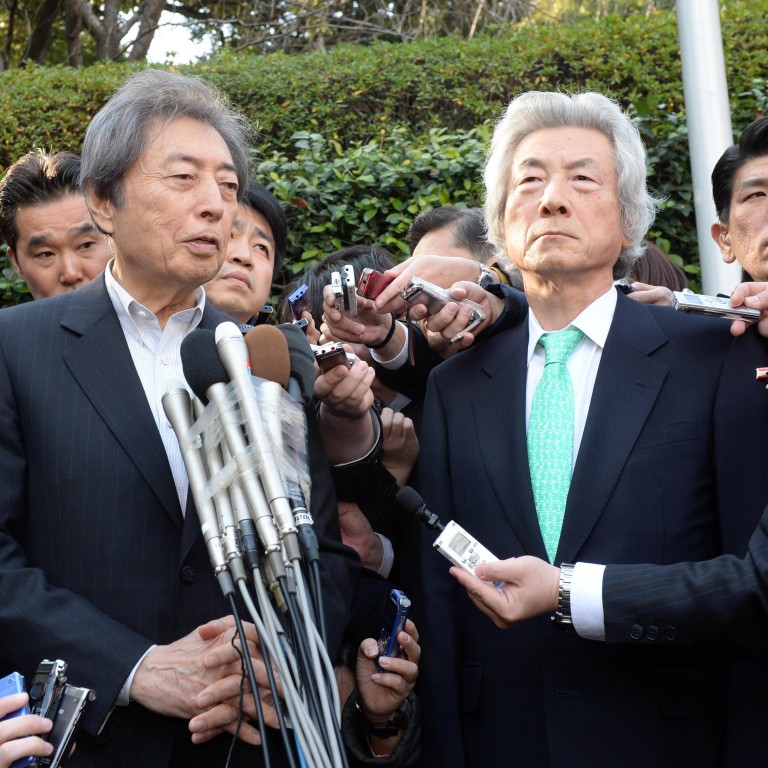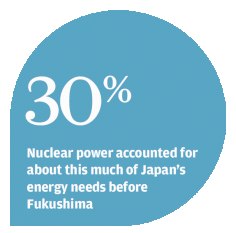
Former prime ministers Koizumi and Hosokawa gang up on Abe over nuclear power
Charismatic Koizumi backs Hosokawa's bid for Tokyo governor on anti-atomic-energy platform
Two former Japanese prime ministers challenged incumbent Shinzo Abe's pro-nuclear power policy yesterday, with charismatic Junichiro Koizumi backing fellow ex-premier Morihiro Hosokawa's bid to become Tokyo governor on a platform opposing atomic energy.

Surveys show most voters favour abandoning nuclear power, but the electorate nonetheless propelled Abe's pro-nuclear Liberal Democratic Party (LDP) back to power in December 2012, largely because of his promises to revive the economy and divisions among anti-nuclear opposition forces.
Asked why he was coming out of retirement, Hosokawa, 76, said: "Because I have a sense of crisis that Japan faces various problems, especially nuclear power, that could imperil the fate of the country."
The maverick Koizumi, one of Japan's most popular prime ministers during his 2001-2006 term, has already been giving Abe a headache with his anti-nuclear power pitch, a turnabout from the days when led the LDP.
"The biggest reason why I support Mr Hosokawa is his view that Japan can prosper without nuclear power. That's worth giving my utmost support to have Mr Hosokawa win," a silver-haired Koizumi, 72, said.
Hosokawa seized the imagination of a public weary of decades of scandal-tainted LDP rule when he formed the pro-reform Japan New Party in 1992. The next year, he took power at the head of a multi-party coalition that ousted the LDP for the first time in nearly 40 years.
But his unwieldy coalition fractured and Hosokawa stepped down after just eight months amid a financial scandal. He was never charged but his image as a bold reformer was tarnished, and he retired from politics in 1998, taking up pottery instead.
How much of a threat the Hosokawa-Koizumi duo poses to Abe is hard to gauge, but clearly Koizumi could be a draw on the campaign trail. The candidacy could tap into a deep well of anti-atomic power sentiment even as the government seeks to restart nuclear reactors off-line since Fukushima.
A tsunami crashed into the plant on March 11, 2011, causing fuel-rod meltdowns, radioactive contamination of air, sea and food and triggering the evacuation of 160,000 people in the world's worst nuclear accident since Chernobyl in 1986.
"Given that the LDP government has been seeking to resume nuclear power generation slowly and quietly without drawing too much popular attention, Hosokawa's candidacy is bad news in itself," said Sophia University professor Koichi Nakano.
"What Hosokawa and Koizumi show is that the anti-nuclear hopes are not held just by left-wing radicals but also by a good number of the middle class, including even those who are conservative otherwise."
A survey by the local Tokyo newspaper showed that about two-thirds of Tokyo voters want to exit nuclear power sooner or later, while just 9 per cent back the government policy.
Still, Hosokawa's age and the way he left office could cloud the outlook for his campaign.
"Hosokawa has little direct contact with Tokyo and Tokyo governor elections are more about name recognition and local connections than policies," said Jeffrey Kingston, director of Asian Studies at Temple University's Japan Campus.
The capital does not host any nuclear plants but the Tokyo Metropolitan Government holds a tiny stake in Tokyo Electric Power, giving it a platform to make proposals about its operations and management.
The Tokyo poll follows the resignation in December of then-governor Naoki Inose - three months after he helped the capital win its bid for the 2020 Olympics - over his receipt of 50 million yen (HK$3.7 million) from a scandal-hit hospital chain.
Other candidates include former health minister Yoichi Masuzoe, 65, running as an independent with LDP support, and former air force chief of staff Toshio Tamogami, a staunch nationalist who resigned in 2008 after denying in an essay that Japan was the aggressor in the second world war.

